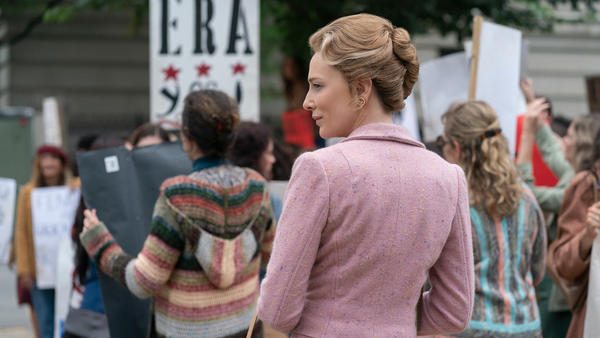Historical drama ‘Mrs. America’ illustrates trials, tribulations of women’s liberation movement

Hulu
With strong female leads such as Phyllis Schlafly, Gloria Steinem and Betty Friedan, “Mrs. America” demonstrates intersectionality of womens liberation movement.
June 3, 2020
Take one part “Mad Men,” add strong female leads, Nixon-era U.S. politics and a dash of ’70s glam and you have the historical feminist drama you didn’t know you’ve been waiting for. Even if you haven’t been waiting for “Mrs. America,” it’s certainly worth the watch.
Created by Davhi Waller and available to stream on Hulu, the nine-part series follows the complexities of the now-labeled second wave feminist movement and the battle over the ratification of the Equal Rights Amendment that took place in the 1970s.
The ERA was first written in 1923 to eliminate legal inequalities between men and women. By 1972, it was approved by the U.S. House of Representatives and Senate and awaited ratification by three-fourths of states in order to be implemented.
Enter Phyllis Schlafly, portrayed by Academy Award winner Cate Blanchett, whose infamous STOP ERA campaign fought to prevent the success of the amendment.
On the other side, members of the women’s liberation movement and some of the most iconic feminists of the time: Gloria Steinem (Rose Byrne,“Bridesmaids”), Bella Abzug (Margot Martindale, “Million Dollar Baby,” “28 Days”), Shirley Chisholm (Uzo Aduba, “Orange is the New Black”), Jill Ruckelshaus (Elizabeth Banks, “The Hunger Games”) and Betty Freidan (Tracey Ullman, “The Tracey Ullman Show”).
While the show is based on true historical events, the showrunners acknowledge the dramatization of said events and the introduction of fictional characters such as Sarah Paulson’s Alice McCray. They also chose not to consult the living people that are portrayed, in order to not be trapped by a single perspective.
That being said, the amount of research and care that went into the telling of these women’s stories is indisputable.
No character, not even Schlafly, is irredeemable, and the effortlessly-cool, undeniably-badass Steinem isn’t without flaw.
“Mrs. America” shows the hypocrisies, flaws, and contradictions of Schlafly’s movement while still making the viewer sympathetic to her, and confused as to why they’re rooting for arguably the most prominent anti-feminist figure in America.
It highlights the groundbreaking work that the women’s liberation movement did as well as the barriers they faced in the male-dominated government, while not being blind to its faults, making sure to discuss the exclusion of queer women and women of color that occured (and later became a major critique of the second-wave feminist movement.)
Today, I doubt anyone would argue on behalf of Phyllis Schlafly, but the show makes it a point to not lean too far in one direction or another, allowing its audience to come to their own conclusions.
It doesn’t show just the battle over the ERA, but the 1976 and 1980 presidential elections (not shying away from political intricacies), Shirley Chisholm’s groundbreaking 1972 run for president, the execution of the 1977 National Women’s Conference, and the ever-changing cultural landscape of ’70s NYC to Southern Illinois to Washington, D.C.
The super-star cast perfectly capture the likeness of their historical counterparts, a groovy title sequence, and the use of real news footage from the time and near-perfect recreation of scenes from that footage further serve the viewer’s immersion.
This was a part of history that I was familiar with, which left me uncertain as I began to watch the show. But I was pleasantly surprised. And while background knowledge is certainly not necessary, I’m sure anyone who remembers the happening of these events will be as well.
In the end, I was left with a sense of melancholy — admiration for the women of the time but with an acute awareness that there’s still so much work to be done.
The issues that are discussed in the show aren’t unique to the ’70s, however, as abortion, birth control, equal pay, intersectionality and the role of white nationalism in conservative movements remain relevant today.
“Mrs. America” can be fun to watch with your family or a jumping off point into the world of feminist politics. Either way, it’s a well-done show that sparks discussions certainly worth having.



























































